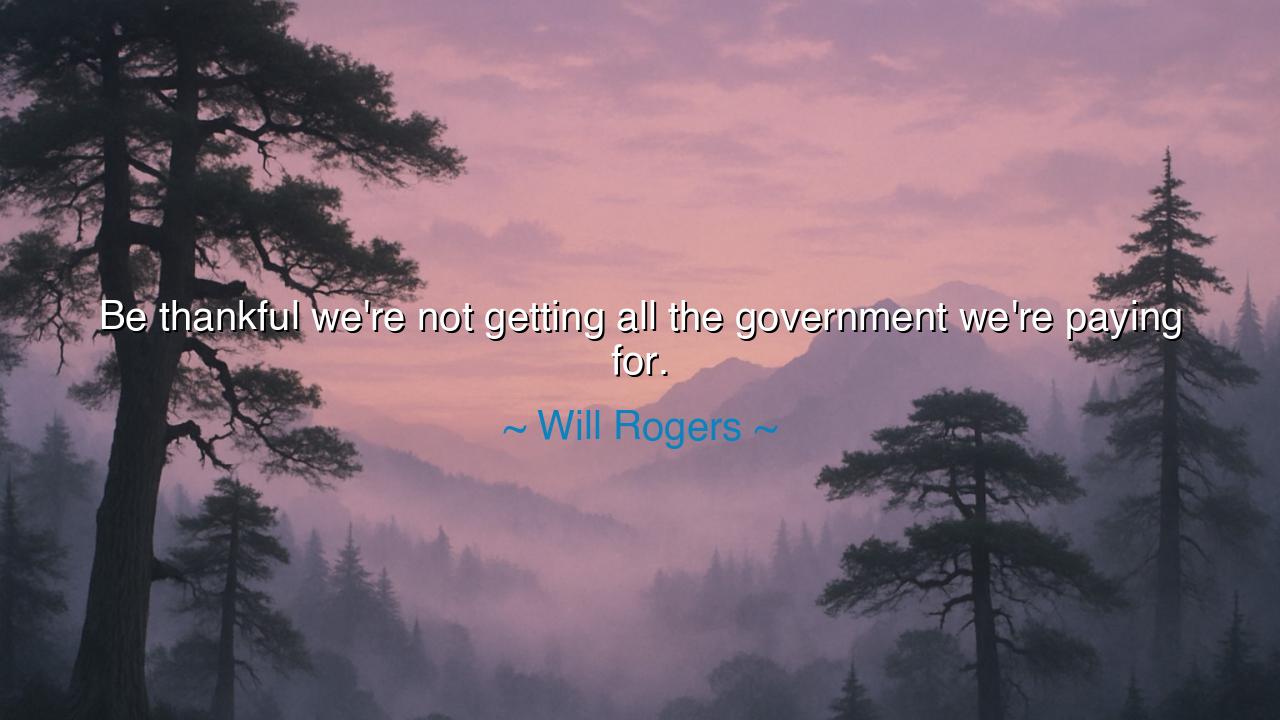
Be thankful we're not getting all the government we're paying






In the age when humor was truth wrapped in laughter, and the American spirit still wrestled with the powers it had created, the sage of the people, Will Rogers, spoke a line both witty and eternal: “Be thankful we’re not getting all the government we’re paying for.” To those who hear only the joke, it is but a chuckle at bureaucracy — the eternal tangle of rules, waste, and inefficiency. But to those who listen with the heart, it is a whisper of profound wisdom. Beneath the laughter lies a warning — and a mercy. For Rogers, who loved his country deeply and saw its follies clearly, meant not only to mock but to remind: that too much power, even when paid for, can become a burden; that too much control, even when well-intentioned, can smother the very freedom it was built to protect.
The origin of this saying lies in the early twentieth century, a time when America was rising from the dust of its youth into the machinery of modern governance. Rogers, the cowboy philosopher, stood between two worlds — the simplicity of the open range and the growing complexity of government halls. With rope in hand and wit on tongue, he lassoed truth in humor. His jest sprang from the endless expansion of government offices and policies, from the sense that citizens paid dearly in taxes for a system that often tangled itself in red tape. But Rogers, with the vision of a man both grounded and wise, saw in that inefficiency a strange blessing. He implied, with a twinkle in his eye, that if government truly functioned at full force — collecting every tax, enforcing every rule, extending every reach — then freedom itself might suffocate beneath its own design. Thus his humor was double-edged: it mocked waste, but it also defended liberty.
In ancient days, the philosophers of Greece would have nodded knowingly at Rogers’ jest. Solon, the great lawgiver of Athens, once said, “The more laws, the less justice.” For he, too, understood that the machinery of governance, once set in motion, must be restrained by wisdom and humility. The purpose of government, as of all human invention, is to serve life — not to consume it. Rogers’ quip carries the same spirit. By saying we should “be thankful” not to receive all we’ve paid for, he reminds us that the flaws of the system, though frustrating, are also safeguards against its overreach. A government too perfect, too efficient, might cease to be humane.
History gives us grim proof of this truth. When the French Revolution broke its chains of monarchy, it dreamed of pure justice — but in its zeal for perfection, it built a machine of terror. Committees governed with deadly precision, laws were enforced with mathematical cruelty, and freedom was devoured by the very order that promised to preserve it. That was government “working” at full power — and it proved that human systems, untempered by mercy and imperfection, can destroy the souls they claim to save. In this light, Rogers’ humor becomes prophecy: be glad, he says, that your rulers stumble, that bureaucracy moves slowly, that inefficiency clogs the gears — for in those delays lies protection from tyranny.
Yet his line also carries a subtler rebuke — one aimed not only at the governed but at the governors. To “pay” for something and receive less is to be reminded that power draws its strength from the people’s trust. Rogers, ever the champion of the common man, believed that government was not an abstraction but a reflection of its citizens. If it is wasteful, it is because we, too, are careless. If it is dishonest, it is because we, too, look the other way. Thus his jest, beneath its smile, urges accountability: the people must not only mock their government, but shape it. Humor becomes a mirror — and the reflection is our own.
Still, there is grace in Rogers’ laughter. He knew that cynicism without affection is poison. He teased his country not because he despised it, but because he loved it fiercely — as one loves a friend whose greatness is marred by folly. His humor did not aim to destroy faith in government, but to restore perspective. In a world where power often forgets humility, his jest reminds us that imperfection can be a blessing. The slow, flawed dance between freedom and order, inefficiency and restraint, is what keeps democracy alive. The laughter he offers is not derision but balance — the kind of laughter that humbles pride and lightens the heart.
Therefore, O listener, take from this teaching not only amusement but wisdom. Be thankful for the inefficiencies that guard against despotism, but do not let gratitude breed complacency. Be vigilant, but also forgiving. Work to make your government better — but never so perfect that it forgets the people it serves. Humor, as Rogers knew, is the breath of liberty — the laughter that keeps power human.
So when next you hear his words — “Be thankful we’re not getting all the government we’re paying for” — let them awaken both gratitude and responsibility. Smile at the imperfection, but strive for integrity. For the true balance of a free people lies not in flawless government, but in the wisdom to laugh, to question, and to remember that every system of power, like every man, must remain just flawed enough to stay human.






AAdministratorAdministrator
Welcome, honored guests. Please leave a comment, we will respond soon